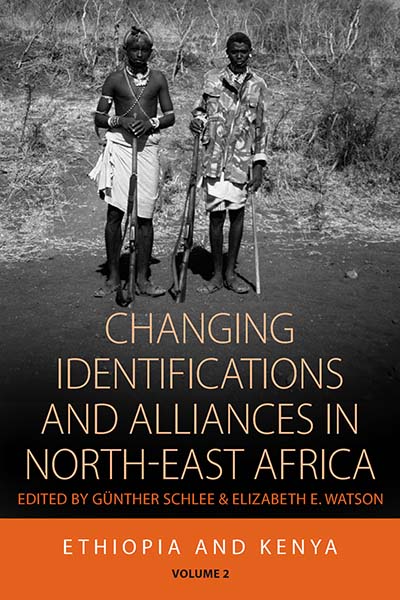Changing Identifications and Alliances in North-East Africa, originally published in 2009, was published in paperback in October. The two-volume collection, made up of Volume I: Ethiopia and Kenya and Volume II: Sudan, Uganda, and the Ethiopia-Sudan Borderlands, gives an overall view of the North-East of the continent and addresses the importance of the group dynamic, as it plays into politics, cultural identity, and war and peace. Co-editor Günther Schlee discusses the beginning of the collection, with its roots planted where his studies of Africa began — and how they are growing.
___________________________________________

Berghahn Books: What drew you to the study of Africa, specifically northeast Africa?
Günther Schlee: Like many students in the 1970s, I was fascinated by South America. When I studied anthropology and linguistics at Hamburg, I took Spanish up to the highest level. I read a lot about South America and followed the volatile politics of that continent very closely. When it was time to think about a PhD project, I was determined to do field research in South America. In order to identify a location and to enable myself to write a decent research proposal, I decided to go there on an exploratory visit on my own expense.
It then turned out that a return ticket for any destination in South America cost over 3,000 Deutschmark and that for a mere 1,000 one could get to Africa and back. So I put my Spanish books aside, bought the “Teach Yourself Swahili” book, studied it during the vacation, then went straight to the advanced Swahili course. Half a year after my decision to change continents I was in Africa with a rucksack on my back and 500 words of Swahili in my head.
Retrospectively it would be easy to find better reasons than the 2,000 Deutschmark price difference of the ticket, but I think that the important decisions in life are mostly triggered by minor events or circumstances and that we should not believe our own CVs in which everything is made to look streamlined and target-oriented.
I have never been to South America and would like to go there one day. It would be like visiting an old love which never materialized. In Africa I spent many years, if one adds all the shorter and longer stays. I have been there almost every year since 1974.
There are good reasons why an anthropologist should be fascinated by Africa. Linguistically, culturally, even when it comes to physical types, it comprised most of the variation of humankind. After all, it is its cradle. But when it comes to our lives, we may be guided by all sorts of reasons apart from the good ones.
BB: Did any perceptions on the subject of group identity change from the time you published the first hardback edition to the publication of the paperback edition?
GS: Since then I have continued to work on group identity and expanded and refined my theorizing about it. I have ventured into the ‘information economics of identification’ and theorized about the incentives of finding out about wrong identity claims by others and how much effort this deserves in different circumstances. A ‘theory group’ in my department has laid out a framework of our theory of identification.
But these new elaborations have not led to the necessity to revise anything we said in ‘Changing Identifications and Alliances’. We have also abstained from attempts to update the case histories in these volumes. Of course, the events discussed here have receded a bit into the past, but that does not make them less interesting from our theoretical perspectives, and what they have lost in closeness to the present, has increased their value for the historian.
What was most challenging about compiling this edited collection in the first place? What was most rewarding?
The exiting thing was to study interrelated conflicts across a vast region, a mosaic of conflict configurations, so to say. This opened perspectives for comparison (to the extent that the cases were separate) and the study of an integrated regional system of conflicts (to the extent that the cases were interrelated).
____________________________________________________
Günther Schlee is currently the director of the Department of Integration and Conflict at the Max Planck Institute for Social Anthropology. His publications include Identities on the Move: Clanship and Pastoralism in Northern Kenya (International African Institute, 1989), How Enemies are Made (Berghahn, 2008), Rendille Proverbs in their Social and Legal Context (with Karaba Sahado) and Boran Proverbs in their Cultural Context (with Abdullahi Shongolo) (both Cologne: Rüdiger Köppe).
Elizabeth E. Watson is a Lecturer in the Department of Geography at the University of Cambridge. Recent publications include: ‘Local Community, Legitimacy, and Cultural Authenticity in Postconflict Natural Resource Management: Ethiopia and Mozambique’ in Environment and Planning D: Society and Space, 2006 (with R. Black), and ‘Making a Living in the Post-Socialist Periphery: Konso, Ethiopia’ in Africa, 2006.
Volumes 2 & 3 of Integration and Conflict Studies
